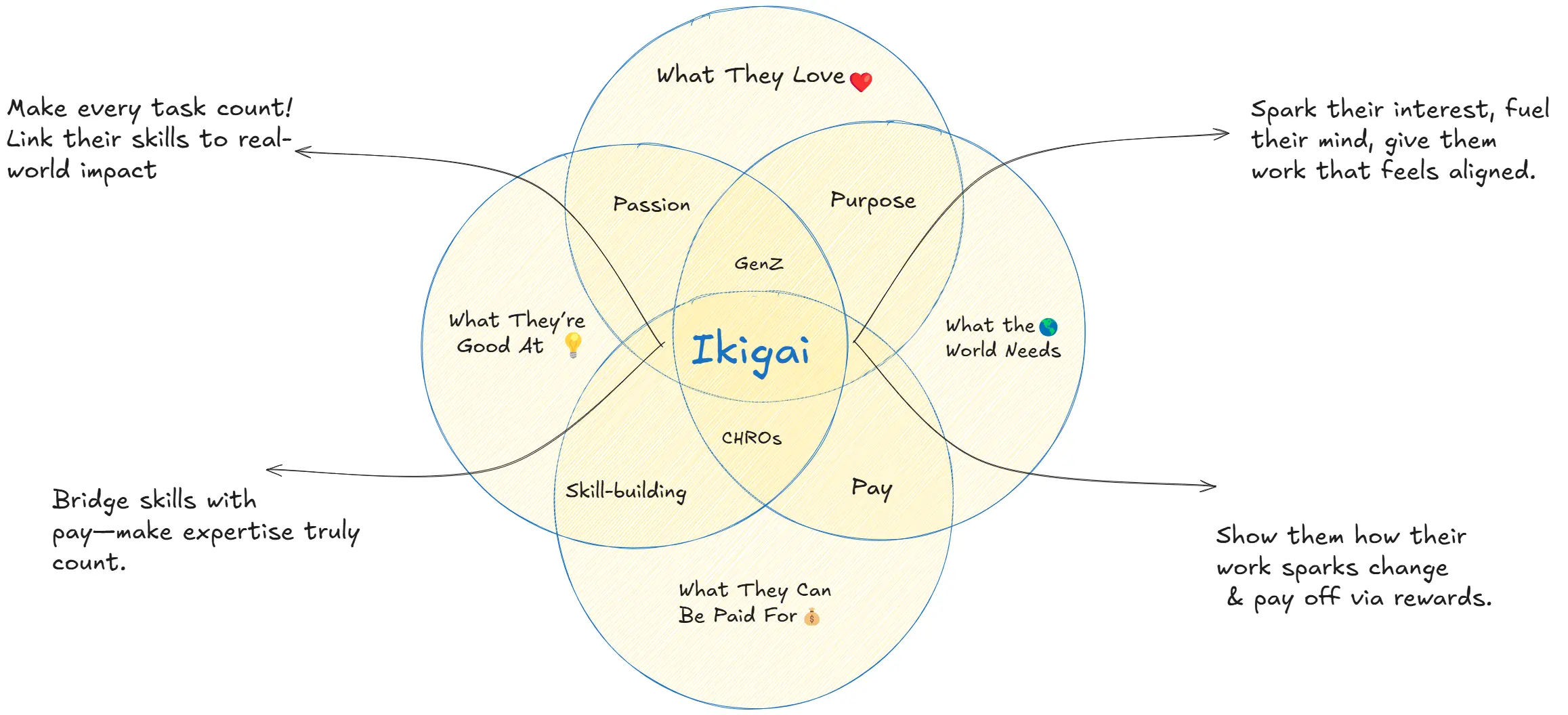Table of Contents
Recently, the phrase “Gen Z employee leave email” became one of Google’s top-searched terms in India a few days back, amassing over 20,000 searches and 1.2 million views on social media posts. This happened when a Gen Z employee wrote an email to the manager saying, “I will be on Leave. Bye!”
The spike in the number of searches shows not just curiosity about Gen Z’s unique communication style but also a shift in how this generation approaches workplace norms with simplicity, clarity, and a touch of boldness.
This digital-age phenomenon reminds us that ‘Change is constant.’ We all know it.
The old ways of working? Long gone.
We have seen our parents stick with one job for decades, putting the company first without question.
Work-life balance? Didn’t exist.
Mental well-being? Nah! Not a topic.
Today, work looks different.
It’s no longer just about a paycheque or a place to clock in. It’s about finding meaning.
And none other than Gen Z has made this clear.
They’re asking themselves questions, “Does this job align with who I am?
Does it bring me joy?”
For them, work needs to tick all the boxes like something they’re good at, something they love, something that makes a difference. This is their version of the Japanese concept of ‘ikigai,’ where they are seeking something deeper: a reason for being in the moment.
For Genz, it’s not about choosing between ‘purpose’ and a ‘paycheque’ but rather, they expect both. And this brings CHROs to the forefront of this shift to bridge the gap.
Because you’re not just hiring people or rolling out policies. You’re helping create workplaces that align with what people value: it’s a shift that will define the future of work.
“The challenge is clear, but so is the opportunity.” This isn’t just about keeping up with change; it’s about leading it.
Ikigai x Gen Z-The Purpose-uit of Happiness
Let’s Spill the tea on purpose – where Gen Zs are rewriting the whole rulebook.
Here is an interesting fact about Gen Z at work: 72% of them would pick a job they love over a big salary. Makes you think, right? But the thing is, 55% of recruiters also think a quick “well done” or a little acknowledgement is enough to keep them happy. But that’s not what Gen Z is after.
They want the real deal, like big projects they can own and awards that show everyone what they’ve achieved. It’s not just about hearing “good job.” They want to see their work has driven change and made a real difference.

Source: unstop.com
In essence, they’re searching for Ikigai—a place where life and purpose collide. “Iki” (生き), meaning life, and “Kai” (甲斐), meaning worth, together form something deeper than just survival. It’s the pull to be more, to matter, to find meaning in every breath we take.
At its essence, Ikigai is the meeting point of passion, skill, purpose, and reward. It’s no longer just a personal pursuit. For Gen Z, it’s the new standard for work. They aren’t looking for a job that just fills time. They want a job that fills them up—something that challenges, changes, and allows them to grow. They’re pushing organisations to step up and create a space where work isn’t just about 9-to-5 but rather it’s a way to mark a difference and grow as a person.
This is where CHROs come in, shaping policies, cultures, and systems that bring together business goals with the ikigai-driven values of this new generation.
Where CHROs Play a Key Role

Genz’s priorities require CHROs to adopt innovative approaches to align organisational goals with their aspirations. Here’s how:
1. What They Love
For Gen Z, passion is non-negotiable. They want work that excites them, makes them jump out of bed in the morning, and feels like more than just a to-do list. Build a two-way street for growth.
While Gen Z shares their digital-native insights and fresh perspectives, CHROs can offer mentorship programs and skill-building opportunities that matter. Think of collaborative projects where everyone learns from each other.
2. What They’re Good At
Skill-building is a top priority for Gen Z. They want to lean into their strengths, get better at what they do, and become experts in their fields. Connect daily tasks to their skill development that would have a bigger impact. Show them how these tasks help them sharpen their abilities, whether it’s problem-solving, or creative thinking.
3. What the World Needs
Purpose drives this generation. 40% of Genz’s fear not finding a job in their preferred fields, their concerns are real and pressing. Gen Z wants to know that their work matters and contributes to something bigger whether that’s solving a problem, driving innovation, or creating social impact.
Let them see how it drives positive change. Make impact tracking as normal as checking emails.
4. What They Can Be Paid For
While passion and purpose are also important, Gen Z still values financial security. They want competitive pay and benefits that prioritize their overall well-being. Create a benefits menu that speaks Gen Z’s language. Mix traditional perks with what really matters to them – maybe it’s mental health support, maybe it’s learning stipends, or maybe it’s paid time for passion projects.
However, providing benefits alone isn’t enough to fully sync in with Gen Z’s broader needs This is where CHROs step in. It’s not just about offering a package; it’s about aligning the heart of the organisation with the soul of its people.
Gen Z doesn’t just want to perform; they want to feel. They want purpose, a place where passion fuels action, where the mission speaks to something deeper. In the end, it’s not just about results; it’s about creating a workplace where passion and purpose are just as important as performance and results.
Aligning Organisational Values and Strategies with Gen Z Aspirations
To align company values with the aspirations of Gen Z, one must first understand their distinct worldview. Raised in an age of constant connectivity and technology, they demand transparency and honesty from the organisations they work for. More than just a paycheque, they seek purpose from a company that stands for something meaningful.
Unlike previous generations, Gen Z does not settle for any job; they want to contribute to something greater. This requires a fundamental shift in approach, creating a culture that mirrors these values and speaks to a generation searching for more than mere survival.
In 2025, they’ll make up more than a quarter of the global workforce, making it essential for organisations to understand how to attract and retain them. Here are some important things for CHROs to think about when attracting and holding on to Gen Z.

Source: unstop.com
1. Flexibility and Recognition are the Gen Z Essentials
Gen Z values flexibility, open conversations, and real recognition. 61% of Gen Z love dynamic roles with varied tasks, while 39% prefer structured, goal-oriented work. They thrive on creativity, challenges, and the latest tools. For Gen Z, it’s not just about doing a job; it’s about feeling ready for the future and staying motivated over time.
Remember, they are not just clocking in but pushing for a future-ready workplace. To keep them interested, workplaces need to offer roles that are exciting and unique and help them learn and grow.

2. Mental Health = The Must-Have Thing
Gen Z won’t compromise when it comes to mental health. 86% of Gen Z want real mental health support, but 27% of HR leaders still don’t think it’s their job. The Stigma around mental health is still hanging around.
Genz’s expects proper care plans, wellness programs like yoga, subsidized counselling, mental health technology subscriptions (e.g. Headspace, Calm) and mental health days. Even small things, like managers checking in or aligning work for personal purposes, can make a big difference. It’s up to management and HR teams to break this stigma and create a workplace where mental health support is accepted and prioritized.

3. Reverse-Mentoring Bridging Generations
Gen Z isn’t here for a one-size-fits-all approach. They want the best of both worlds. Research shows that 63% of Genz’s value learning from experienced professionals who understand the challenges of work. However, this doesn’t mean they want constant supervision or micromanagement – they also need space to work independently and make their own decisions.
The solution to is setting up reverse-mentoring programs, where both younger and older generation employees can learn from each other. When younger employees share fresh ideas with company leaders, it creates a valuable exchange.
In return, they gain insights from the perspective of more experienced colleagues. This multigenerational collaboration helps build stronger relationships and improves the retention rate of the organisation.

4. More Than Just a Paycheque
Gen Z is looking for more than just a paycheque; they want a job that supports their personal and professional goals. Over half (56%) value opportunities for career growth, while 47% are focused on maintaining a healthy work-life balance.
But it’s not just about the job itself; they want a company culture that feels like a good fit, giving them the flexibility and time to recharge outside of work. If you create an environment that meets their needs for both growth and well-being, you’ll have a team that’s committed for the long term.

5. DEI Non-Negotiable for Gen Z
For Gen Z, workplace diversity, equity, and inclusion (DEI) aren’t just “nice-to-haves”; they’re non-negotiable. This generation wants to work for companies that genuinely value diverse perspectives, reflect their social justice ideals, and take real action to create inclusive cultures. They’ll stick with companies that not only reflect their ideals but also take visible steps toward equity and inclusion.
Workplaces should make DEI a core part of your brand and culture, ensuring every employee feels they’re part of the journey. Host workshops, bring in DEI experts, and empower employees to recognize and challenge biases, making inclusion a shared responsibility.

6. Combating Loneliness-Building Connections
Gen Z employees are the most connected through technology but often feel the loneliest. Many of them work remotely or in hybrid setups, which means they miss out on forming close work relationships that usually develop in person. To help, offer them the flexibility to choose their work style but also create chances for them to interact face-to-face through team-building events, project kickoffs, or simple celebrations.
If in-person meetings aren’t possible, virtual coffee chats or recognizing someone’s contribution during a team meeting can also help build connections.
Gallup research shows that having a close friend at work leads to better engagement and performance, so making these connections will not only help your team feel more supported but also improve overall success.
Creating an Inclusive Environment Everyone Thrives
Once you bring Gen Z into your team, it’s important to make sure they feel connected with everyone else. Each generation has its own unique perspectives, skills, and values. To create a truly inclusive environment, it’s important that everyone feels heard, valued, and able to thrive. “This means building a culture where people of all ages can collaborate, learn from each other, and grow together,” says Henderson.
Much like the concept of Ikigai—where passion, skill, purpose, and income intersect—Gen Z seeks a workplace where their values and personal growth align with the company’s mission. After all that Gen Z has seen: the pandemic, the climate crisis, and the weight of an uncertain world. They are not merely looking for a job.
For CHROs, the answer is not in fitting them into old molds, but in creating a space where purpose and development are not just ideals, but the very air they breathe. This is not merely a response to their needs; it is an invitation to shape something greater: a culture where the wisdom of every generation is woven together into a future that holds meaning for all.
This is the shift, the quiet yet powerful turning of the tide: here work becomes not just labour, but a way of being.







